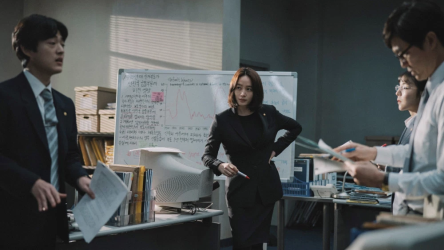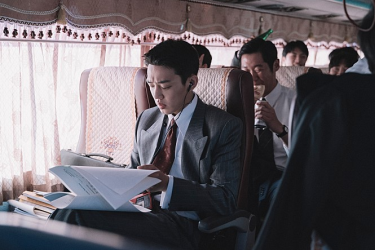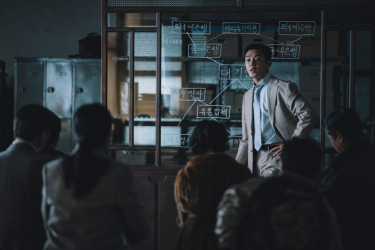Now in it’s not-quite-consecutive third year, our tradition of going to see a Korean movie on Christmas Eve (Day) took us to Koreatown and Default, the story of the 1997-1998 Korean financial crisis, probably engineered by George Soros (who gets a mention) and used a front to bring Korea under the thumb of the IMF—engineered by Clintons, apparently, who aren’t ever mentioned, curiously enough, but only referred to as “American Interests”.

I want to make a Vince Foster kimchee joke, but I can’t.
As an American, I can assure you my interests in Korea are limited to movies and food. I’m happy if they keep on being their Korean selves. But somehow in this world, we get the worst self-serving narcissists as leaders and their clearly selfish motivations get labeled their country’s interests.
Anyway, in the Korean tradition, this film is about government incompetence at the highest level, while the smart and insightful numerologist who really knows her stuff gets the short end of the stick and the country goes to hell. In this case, our heroine is Si-hyun (Hye-su Kim, A Special Lady) who says, “Hey, everybody’s over-extended and running around with bad loans, so we better come clean, take our lumps and try to salvage the economy while we still can.”
The government, of course, doesn’t want to do this. They HATE taking lumps. There is probably a situation in world history where an administration said, “Yeah, mea culpa. We let this get out of control and we’re going to fix it, sorry.” But I can’t think of one, and what happens instead is they say “DO NOT BE ALARMED. EVERYTHING IS FINE. WE ARE NOT TURNING YOUR COUNTRY OVER TO GLOBALIST BANKERS” while turning over Korea to globalist bankers—in this case being represented by Vincent Cassel (Black Swan, Shrek).

Jung-hak rides the Business Bus!
Meanwhile, Jung-hak (Ah-in Yoo, of this year’s Burning, which the Boy saw but I did not) has noticed the financial shenanigans and leaves his comfortable job in BigKorp to strike out against the conventional wisdom. He is successful at exploiting all the ups-and-downs, but he’s also a kind of complex person—alternately unhappy about the destruction and indifferent to it. Whenever the government can do the right thing or the easy thing, he simply predicts they’ll do the easy thing, and makes a fortune.
Caught in all the mess is Gap-su (Jun-ho Heo) who runs a small bowl factory. Moments before things start to go south, his business partner convinces him to get into debt along with everyone else in order to fulfill an order from a large (and soon to be defunct) department store.
It’s like a Korean Big Short, without the Adam McKay smarm and with a lot more nationalism. Everyone in it is trying to do their best, except the IMF, which really does seem to be intent on bringing the world under a One World Financial Rule. It was interesting to me because I didn’t disagree with all the IMF’s recommendations in spirit: The Eastern world still seems to have a feudal approach to employment, where it becomes impossible to fire anyone and everyone is presumed to have the same trade for their whole lives. But even in that, I could see that the recommendations were designed to harm the little guy and keep the big, easily manipulated corporations—well, easily manipulated, and owned by foreigners.

“And this is why we’re all f***ed!”
And then, too, diversity don’t mean a thing if people don’t do things differently.
Typically good Korean film, in the sense that we’re rooting for our heroes, even when they may even be at odds. If Si-hyun succeeds, after all, Jung-hak will be ruined—but we sort of get the sense that Jung-hak would prefer to be wrong about some of these things. Gap-su is doomed because nobody will look out for him, but if he can persevere he can in the long run survive even this.
Yeah, I guess that’s the distinction between this and The Big Short: That movie was comical, cynical and had an everyone-is-rotten attitude. The Korean movie treats its people with dignity, and uses the idea of rottenness sparingly. The Korean attitude is more populist, I think: Adam McKay is saying “Americans are stupid. You in the audience are perhaps slightly less stupid.” Director Kook-hee Choi, by contrast, is saying “Keep your eyes open, be diligent and honest, and Korea can be better than ever.”
Interesting distinction and the reason we’ve seen movies in the Korean top 20 than in the American top 20.

Vincent Cassel bein’ evil.
